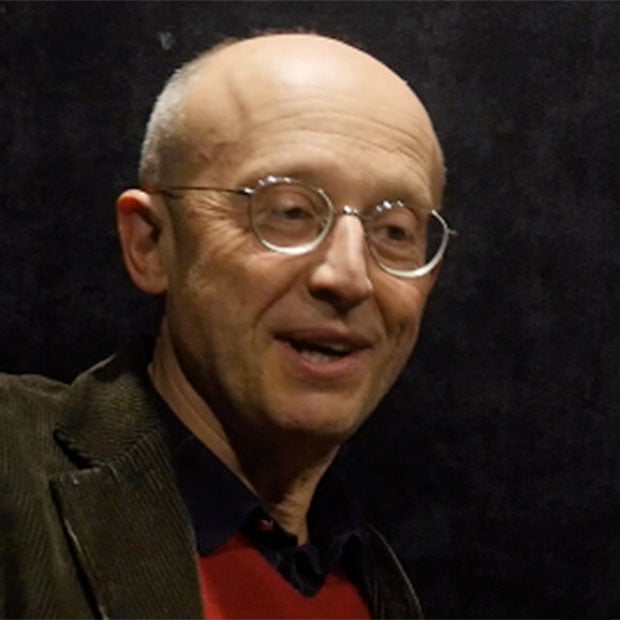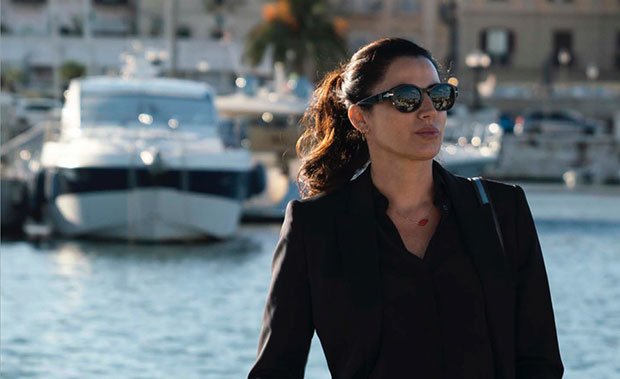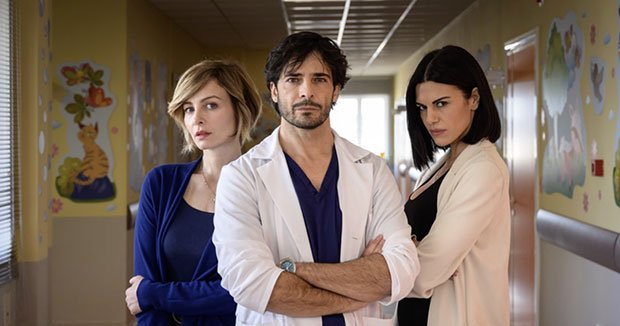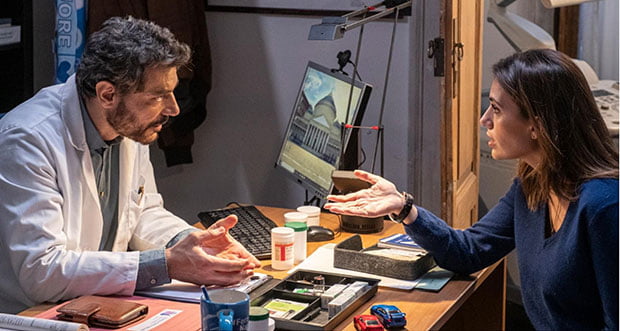Rai – Italy
SCHEDULE WATCH PROFILE: Italian public broadcaster Rai is reaping the rewards of its push into original fiction using diverse and regional voices. Gün Akyuz reports.

Fabrizio Zappi
Overview
Italian pubcaster Rai’s ongoing investments in local fiction have already made it Italy’s drama powerhouse over the past decade. It remained the largest broadcaster and investor across free and pay TV in 2020 and 2021, although competition for local audiences and talent from global streamers is gaining pace.
A significant differentiator for Rai has been its success in delivering on its universal public service mission to serve all audiences and represent an increasingly diverse range of voices across Italy’s regions in 2020 and 2021, according to Rai Fiction’s deputy director Fabrizio Zappi.
Zappi outlined Rai’s fiction strategy and mission in July at the inaugural Audiovisual Producers Summit held in Matera, southern Italy. He said: “At Rai Fiction we try to implement two main concepts: inclusivity and representing the nation’s lived experience.”
Rai represents its viewers in a number of different ways, by providing stories ranging from those that reflect the daily lives of viewers to others set at the national level, he explained. When it comes to inclusivity, Rai seeks to leave no one behind, regardless of age, socio-demographic background or level of education, he said.
Rai’s impact is evident in its continued dominance of the national fiction viewing rankings. Once again, this year it aired the most watched dramas among all audiences nationally. Between January and May 2021, flagship channel Rai Uno clocked up an average 5.7 million viewers and 23.4% share, led by evergreen police drama Inspector Montalbano, pulling in 9.5 million-plus viewers and a 39.5% share for its latest run, but with several newcomers and a range of genres also making a notable impact.
Rai Fiction’s strategy hasn’t changed significantly under Maria Pia Ammirati, who was appointed director of fiction in late 2020, following former fiction chief Eleonora ‘Tinny’ Andreatta’s move to Netflix last summer. It was Andreatta who rolled out the current strategy of diversity in genres, styles, voices and regional representation, and Ammirati is still seeing out her predecessor’s commissions. However, she has put her own stamp on the division’s output and dubbing the pubcaster’s fiction mission as a “factory of storytelling” for the nation.

Crime drama Le indagini di Lolita Lobosco (The Investigations of Lolita Lobosco)
At their core, these stories are tools to reach viewers in recognisable, relatable and reassuring ways, said Zappi. “I believe this is one of the basic principles of giving substance to and carrying out the role of a public service,” he said.
“Another way is by narrowing the gap. We know that Italy is still in a pandemic, which has particularly highlighted and increased every form of social divide. There’s a cultural gap, an economic gap and a housing gap that months of lockdown have exposed. There is also a geographical gap. We’re trying to reduce this by making ourselves useful, relatable and appreciated by everyone.”
This is achieved through Rai’s multiplatform presence, Zappi added, on the one hand through its digital platform RaiPlay, which is freely accessible to anyone, and on the other with flagship channel Rai Uno helping to bridge the social divide by bringing families together.
Rai’s ongoing impact within Italy’s audiovisual industry is also visible. Rai Fiction remains the largest provider of drama – fielding up to four primetime evenings of drama on flagship Rai Uno in peak season, as well as its daytime serials and soaps; drama on Rai Due; its soap Un Posto Al Sole on Rai Tre; and digital-first drama on RaiPlay.
Rai is also the main investor when it comes to doing business with regional film commissions and producers across the country. In addition, it has been attracting top screenwriters and directors from Italian cinema, including Marco Bellocchio and Daniele Luchetti, said Zappi. Calling the past division between cinema and television “almost anachronistic,” Zappi cited Rai’s attractiveness to Italian filmmakers as further proof of its now central role in the audiovisual industry.
According to analysis by Italy’s Association of Producers (APA), Rai accounted for 74% of all first-run fiction output hours across all platforms in the 2019/20 season, a period that overlapped with the onset of the pandemic. Its biggest hit last year was Lux Vide’s new medical drama series Doc: Nelle Tue Mani, which launched in spring 2020 on Rai Uno, striking a chord with a pandemic-ravaged nation. Even in its repeat showing this summer, the series continues to attract viewers. A new season is due to launch in 2022.

Family medical drama Fino All’ultimo Battito
(Until the Last Beat)
“This year we had a slight fall in investment due to the drop in advertising revenues, among other challenges,” said Zappi. “But at Rai Fiction, we’ve tried to make up for this decline by establishing increasingly effective international partnerships; by inviting producers to increase their share of investment; but most of all, by facilitating and promoting regional film commissions [as sources of funding], which have become very valuable because we want more and more of our stories set within Italy’s regions and provinces.”
Current programming, original production, drama, formats
Rai’s fiction output has been evolving in line with Italian viewers. “Public tastes have evolved and become more sophisticated over time and Rai’s own fiction storytelling has also diversified to reflect this,” Zappi said.
Highlighting three of Rai’s most successful new dramas launched between January and May 2021, Zappi said all had been set in regional provinces of Italy. Alongside 20-year-old Inspector Montalbano, set in the Sicilian city of Vigata, Rai launched a number of new regionally based dramas on its flagship channel. They comprised the female-led crime drama Le indagini di Lolita Lobosco (The Investigations of Lolita Lobosco), which pulled in 7.4 million viewers and a 30.5% share, crime comedy Màkari (6.7 million, 27.3%) and dramedy Mina Settembre (6.3 million, 24.9%).
All three new productions are proof of Rai’s successful efforts to regionalise and tap local production resources, without having to resort to investment from abroad, said Zappi.
Until 10 years ago, keeping costs down often meant shooting abroad in more affordable countries, such as Eastern European, he said. These days, however, Rai is busy tapping Italy’s 20 different regions and film commissions to produce fiction across a wide range of projects.
The diversity of voices increasingly visible in Rai’s fiction has also allowed it to push further into new spaces, targeting younger viewers on digital platforms, where it is tapping both local ideas and international formats.

Mental was adapted from YLE Areena’s comedy drama Sekasin
“Rai has given us the freedom to investigate new genres,” said Zappi, highlighting new young-skewing comedies in the pipeline for RaiPlay, among them #lepiùbellefrasidiosho (10×25‘). Inspired by the success of social media vignettes satirising Italian politics, the series is produced by Simona Ercolani for prodco Standbyme, together with Rai Fiction.
Another RaiPlay exclusive was the recently launched 10-parter Nudes, adapted from an NRK drama about revenge porn. The Italian version, made by Bim Produzione, attracted 1.5 million online views, most of them in younger demos, said Zappi.
Another young-skewing Scandinavian format picked up by Rai was Mental (8×25’), adapted from YLE Areena’s comedy drama Sekasin from Finnish prodco It’s Alive Film. The Italian version launched on RaiPlay last December, breaking new ground as the first Italian drama to address youth mental health issues.
Now in the pipeline is Bangla, a serialisation of the Italian movie of the same name produced by Fandango a couple of years ago. Addressing the theme of multicultural integration, the series is modern and informal in style, said Zappi. By tackling issues with a strong social impact, Rai was innovating with genres in ways unsuitable for mainstream generalist linear TV, he said.
Also visible in Rai’s fiction line-up is a growing range of hybrid genres as a means of exercising its public service remit. “It allows us to propose a constant flow of different formulae and narrative styles within a mainstream form of storytelling,“ said Zappi, citing its hit hybrid crime series The Investigations of Lolita Lobosco. “The core strength is the connection between character and the region, which has expanded well beyond its forefather, Inspector Montalbano, and is also visible in series such as Imma Tataranni [about a female prosecutor], set in Matera and which offer viewers a slice of their daily lives,” Zappi said. Another successful hybrid was Commissario Ricciardi, which launched in January. Adapted from the novels by Maurizio de Giovanni, it mixes crime, thriller, mystery and melodrama.
This fall, from September through to December, Rai Fiction has lined up a new hybrid family drama series called Fino All’ultimo Battito
(Until the Last Beat), in which a heart surgeon is forced to break the code of medical ethics in order to save his son who needs lifesaving heart surgery. The series is made by prodco Eliseo Cinema together with Rai Fiction.

Jules Verne adaptation Around the World in 80 Days (Il giro del mondo in 80 giorni)
“We have also embarked on unusual genres through our international partnerships, such as the mystery genre Soppravissuti [Survivors], which follows in the footsteps of La Porta Rossa, also a supernatural drama,” said Zappi. A product of Rai’s Perugia-based writing school, Soppravissuti (12×50’) is led by Rai Fiction, Italian prodco Rodeo Drive and French prodco Cinétévé, in coproduction with ZDF and France Télévisions under The Alliance partnership. The series has already been filmed in Genoa and is due to launch next year on RaiPlay and Rai Due.
“It’s basically a task of developing and innovating with hybrid genres across our non-linear offer of RaiPlay and through international coproductions,” said Zappi.
Already launched under The Alliance is international copro Leonardo from Lux Vide, with Aiden Turner in the lead role. Airing this spring, the drama pulled in six million viewers and a 24.2% share on Rai Uno.
Next up via the The Alliance is adventure series Around the World in 80 Days (Il giro del mondo in 80 giorni), adapted from the Jules Verne novel. Filming was delayed last year due to Covid restrictions, but the series is now due on Rai Uno this fall. The eight-part coproduction, starring David Tennant, was led by France Télévisions and made by Slim TV and Federation Entertainment.
Also in The Alliance production pipeline is eco-thriller The Swarm – entitled Il Quinto Giorno for Italy – a ZDF-led production, which Zappi said pushed genre innovation yet further. “It deals with current themes of environmental sustainability that are particularly important to us, and which perhaps we have not yet dealt with in this way through storytelling,” he said.

Rai’s successful new comedy-drama Mina Settembre
Among Rai’s international collaborations is the third instalment of Rai and HBO’s adaptation of Elena Ferrante’s My Brilliant Friend, produced by Fremantle-owned prodcos The Apartment and Wildside, along with Fandango Productions. The event series is scheduled to launch on Rai Uno in 2022.
Also in the works via The Alliance partnership is the French-led production Germinal, adapted from the novel by Émile Zola. Rai is on board as a coproduction partner, with France Télévisions and Salto.
Elsewhere, Rai has also been growing its docu-fiction projects drawing on Italian history. Among them was last year’s film on Italian Nobel Prize-winning neurobiologist Rita Levi-Montalcini.
This spring saw the launch of biographical series Chiara Lubich L’amore Vince Tutto, about the teacher and founder of Focolare, a movement to promote universal fraternity. The series, which premiered this spring, attracted an audience of 5.8 million and a 23.2% share of all viewers. Lined up for December is a film about celebrated Italian ballet dancer Carla Fracci.
“They’re female personalities who have each made a huge contribution to Italian society across the arts, science and politics. Mining our collective history is still important and should not be forgotten,” said Zappi.


















.jpg)




























